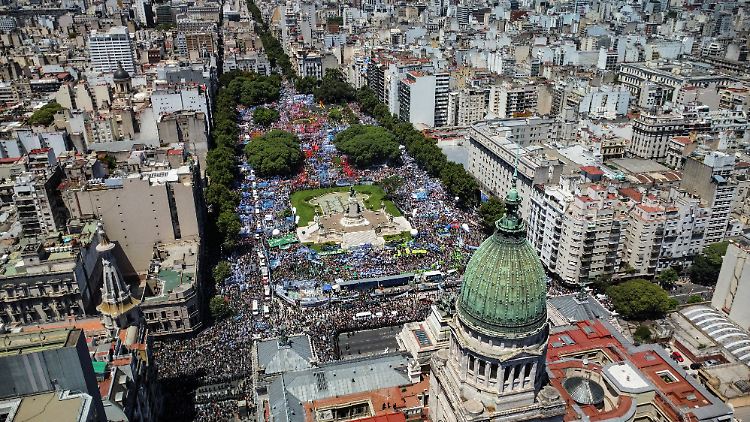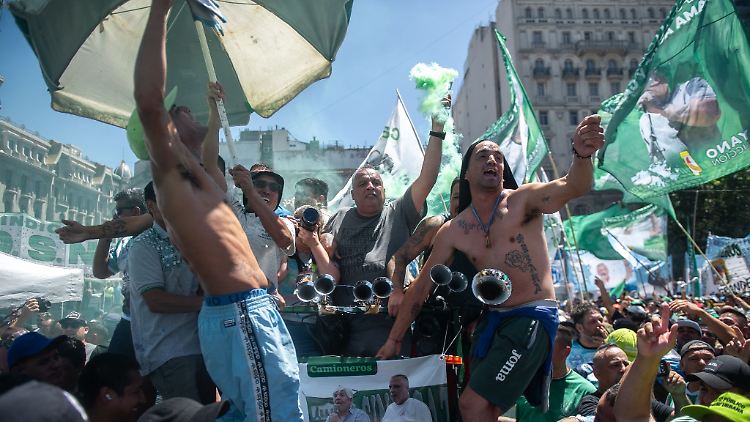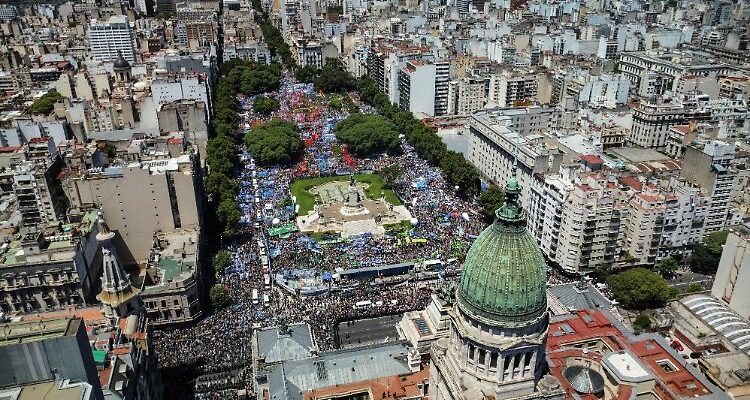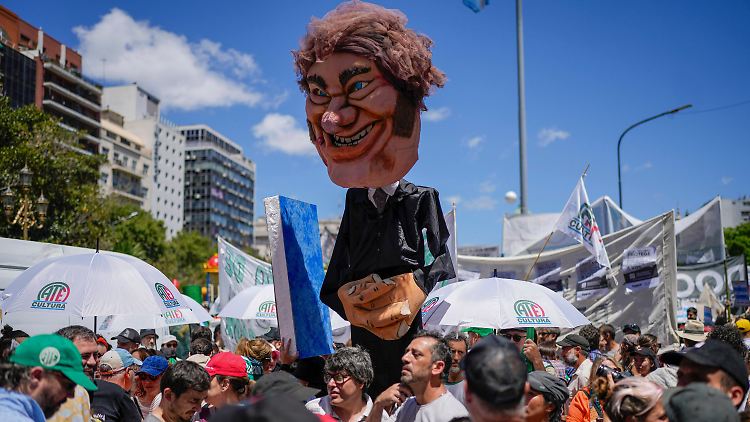Workers paralyze Argentina
The resistance against Milei is forming
By Roland Peters
January 25, 2024, 6:07 a.m
Price explosion, general strike, legal counterfire: Argentina’s libertarian President Javier Milei isn’t having an easy time in his first few weeks. Now the workers and opposition are united on the streets. A union leader warns the economics minister.
Ideally, we would like to tear down everything from the past decades and then see what the free market does with the rubble while it occasionally approves decrees with the presidential scepter. According to his statements and reform projects, this is roughly how Argentina’s libertarian head of state Javier Milei imagines his four-year term in office. But there is strong resistance to this. On Wednesday, a general strike paralyzed large parts of public life. People also demonstrated across the country, with figures ranging from 40,000 to 600,000 in the capital Buenos Aires to a total of 1.5 million throughout Argentina.
For hours, members of social movements, the opposition, the CGT trade union federation and angry Argentines marched towards the congress in the heart of the capital. At the rally there, Milei’s opponents appeared combative. “We will not take a step back,” said Héctor Daer, one of the CGT chairmen: “The fatherland is not for sale.”

Rally against Milei’s reforms in the center of the capital. People also took to the streets elsewhere.
(Photo: REUTERS)
The head of the influential long-distance drivers’ union, Pablo Moyano, warned Economy Minister Luis Caputo. “If the minister carries out the measures of starvation, cuts and layoffs, the workers and pensioners will throw him into the Riachuelo.” The section of the river, which also flows through the working-class district of La Boca, was in the past one of the most polluted rivers on the South American continent. Many residents disposed of their garbage there due to a lack of alternatives.
Milei wants to turn the country towards right-wing liberalism with his two major projects, a mega-decree with over 300 changes to the law and another package called the “Omnibus Law,” which includes hundreds more modifications. Congress should remove itself from power for at least a year due to a “public emergency” and allow the president to rule by decree. The privatization of almost all state-owned companies such as the railways and the fiber optic network are also on the agenda.
First muscle flexes on the street
With the first muscle flexing on the country’s roads, a conflict that was foreseeable is coming to a head. Milei’s claim during the election campaign that “the caste” of politicians and companies would pay to trim the state budget to a black zero was almost adventurous. Shortly after his election victory, Milei suddenly warned that the Argentines would have to prepare for a tough first year. “Not a proposal to fight poverty. If nothing is on the table, there is no freedom,” read one of the banners of social movements from the lower income classes.


Members of the long-distance drivers’ union at the anti-Milei protests
(Photo: Cristina Sille/telam/dpa)
The poverty rate in Argentina is now 45 percent and rising. Inflation shot up by 25.5 percent in Milei’s first month, which sometimes reached absurd proportions: a half liter of olive oil (produced in Argentina) cost up to 12 euros in supermarkets at the beginning of the year, but an upscale red wine from the same region just half. The price of gasoline almost doubled. South America’s second largest economy has many public sector employees, domestic industry has low productivity and undeclared work is widespread.
Technological and therefore internationally competitive agriculture is at the same time highly profitable – the state levies export duties on world market export revenues in US dollars to finance its budget – but creates comparatively few jobs. The national currency, the peso, continues to lose value against the US dollar and the mountain of debt is constantly growing.
“This is abuse”
Large parts of the mega-decree are already in force. “This is misuse of a tool,” says Andrés Gil Dominguez, professor of constitutional law at the Universities of Buenos Aires and La Pampa. There is no sudden emergency situation and the Congress is functioning. “In the logic of its previous rulings, the Supreme Court has no choice but to declare the decree unconstitutional.” So far there have been 52 corresponding lawsuits, the first of which will be heard from February 1st. However, it can take months for a verdict to be reached and is therefore lagging behind reality. The tenant law, for example, has been abolished by the decree; the contracts are completely a matter of negotiation.
Security Minister Patricia Bullrich described the trade unionists as “mafia-like”. They would resist the change that society had democratically decided on. “No strike can stop us, no threat can intimidate us,” she said. The opposite is actually the case: since Milei took office, Bullrich has tried to keep resistance off the streets with new regulations and threats against social movements and unions. After the first demonstrations against the new course, the government sent the participating organizations invoices for the costs of the police operations. Protesters who move on the streets instead of on the sidewalks are threatened with imprisonment.
The controversial reform package including the disempowerment of Parliament, which is based on an alleged public emergency, is scheduled to be discussed in Congress on January 25th. Milei’s party La Libertad Avanza (“Freedom Advances”) does not have a majority in either chamber, so it has to negotiate. The original bill has been massively revised in the past few days. The strike took place anyway. Public administration was restricted and some of the public health services also stopped working. The state airline Aerolíneas Argentinas canceled all flights over the capital; the country’s hub and important in continental air traffic. Banks closed at midday, and local public transport and all trains in the country were at a standstill until midnight.
Organizations are warming up
The last strike by the trade union federation took place in May 2019, then under the liberal-bourgeois President Mauricio Macri. He was voted out six months later and the socially oriented Peronist President Alberto Fernández came to power. Under him, the unions remained quiet and things were negotiated behind closed doors. But Milei wants to disempower the powerful workers’ representatives in order to liberalize labor law. The Argentine judiciary has already accepted individual projects, such as a virtual ban on strikes for certain sectors, bans on gatherings in the workplace or the end of compulsory contributions to unions. “The articles of the Omnibus Law reformulate the entire socio-economic order provided for in the Constitution,” says Dominguez.
Argentina is a strike-loving country, and a lot of political pressure has been exerted across the street in the past. But with the pandemic, the usual mechanisms partially fell asleep. Now the organizations are warming up again; After taking office, no president managed to get the unions onto the streets for a general strike more quickly. “As fuel and food prices rise, the social conflict will deepen,” says Pablo Moyano, head of the influential long-distance drivers’ union. If the everyday situation of Argentines does not improve, their resistance will most likely continue to grow.

